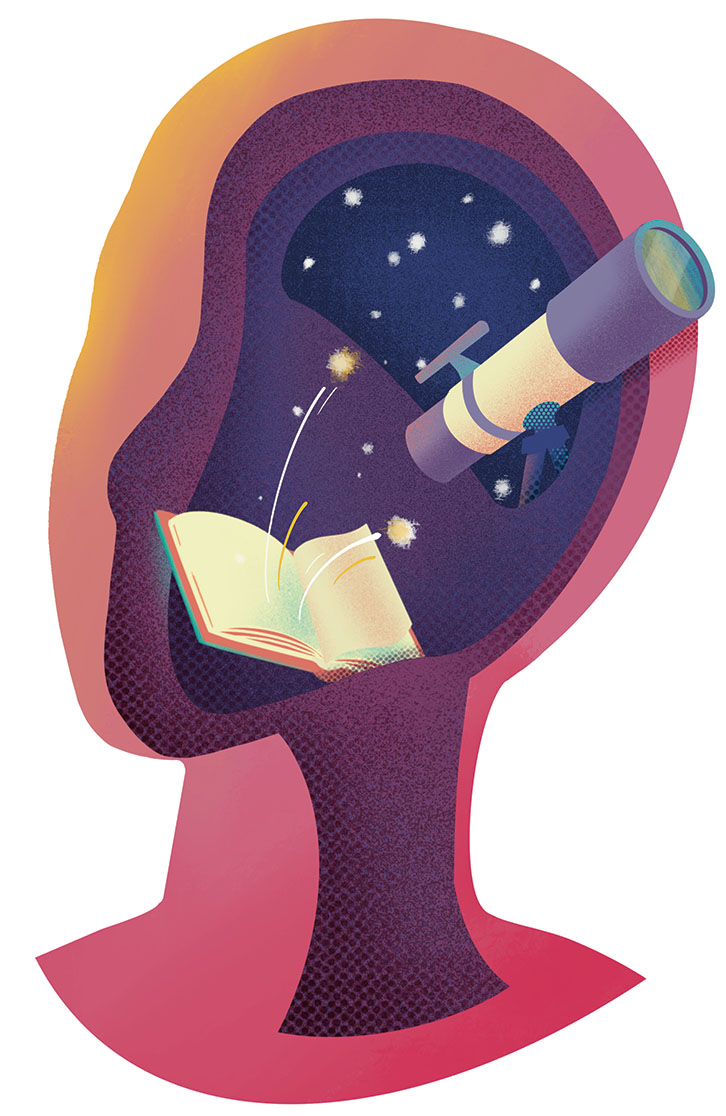
‘The conquest of happiness’ then and now
Fall/Winter 2021 issue
"Certain things are indispensable to the happiness of most men, but these are simple things: food and shelter, health, love, successful work, and the respect of one's own herd."
So wrote author and philosopher Bertrand Russell in his 1930 book The Conquest of Happiness, which attempted to clarify what causes unhappiness. More than 90 years later, we wondered whether Russell’s basic prescription still rings true today. We asked Mount Royal University philosophers Dr. Allison Dube, PhD, and Dr. Gülberk Koç Maclean, PhD, to discuss Russell's thinking.
This little book Russell wrote between the two world wars is not a philosophical book on happiness, but rather, what we call today a 'self-help' book for the layperson who suffers from unhappiness in a 'civilized' country,' ” says Koç Maclean in her description of The Conquest of Happiness.
“Russell discusses sources of unhappiness, such as nervous fatigue, boredom, envy, the sense of sin, fear of public opinion, as well as sources of happiness, such as zest, affection, effort, impersonal interests. He suggests practices we should avoid and practices we should embrace in order to conquer happiness.”
Koç Maclean, a senior lecturer in humanities and winner of the 2015 Bertrand Russell Society Book Award, and Dube, an associate professor in general education whose research focuses on the works of Jeremy Bentham, dissect those practices and more through this Q and A.
Q
Russell emphasized being curious and exploring interests outside of our own daily lives to forget our worries and keep our perspective on 'our place in the universe.'
Was he right?
Koç Maclean
I agree with Russell that if our basic needs are met, self-absorption is not conducive to happiness. Russell believes that the antidote to self-absorption is the development of a friendly curiosity in other people and things, which serves to remind oneself that one is not the only thing in existence, but rather part of a universe with innumerable beings of different kinds. The search for knowledge about this universe, in any shape or form — be it an interest in certain kinds of roses or an interest in black holes — has a significant role in achieving happiness.
Q
Do you agree that Russell’s recommendation of developing impersonal interests is conducive to happiness?
Dube
I agree, but the 'friendly interest' he advises may not be enough. Jeremy Bentham (1748 – 1832) writes on the concept of ennui in Chrestomathia, in which he describes a Mr. Beardmore, whose mind was 'richly stored with pleasant anecdotes' and 'useful information on a great variety of topics.' He approached his job, and many other things, with what Russell might call 'zest.' For example, having 'a lively, popular facility of singing easy songs.' He was a good and popular guy, and would have been a hit at karaoke night. However, all of his understanding 'was derived not from books but from living studies.' Sadly, 'from the fatal hour in which he quitted business … he grew insensibly more and more the victim of listlessness and ennui.' Ennui, a feeling of weariness or boredom, is also a danger to the opulent, because they have played 'a comparatively passive part' in the obtainment of pleasures. The greatest security against ennui? Learning. One’s mind must contain 'a richly stocked and variegated garden of art and science.'
This is not exactly to disagree with Russell. It is to emphasize that the 'friendly interest' he refers to at times will not, on its own, do the job. We need a kind of engagement in learning, and about different things, that is active to the point that we would call it mental labour. In this sense, I worry about the future happiness of many in our world now, who, like Mr. Beardmore, have gathered a little knowledge about a lot, 'passively' as opposed to 'actively.' Social media provides a never-ending deluge of information serving a friendly (or often unfriendly) interest in other people; but the jury is out on whether a life lived largely through passively consuming information and entertainment can truly generate happiness.

Q
Russell said happiness doesn’t just happen without concerted effort — hence 'the conquest.' The world hasn’t become any easier to live in since he wrote this.
Are his views relevant today?
Koç Maclean
Russell is right in his observation that there are so many causes of misery in this world that for most people happiness is not something that can just fall into their laps; they have to work towards it — adjust their beliefs, attitudes and practices as much as they can in order to achieve it.
In the parts of the world where the basic needs and security of almost all people are met, which is Russell’s focus in this book, people’s lifestyles are such that if they are economically middle-class, they develop nervous fatigue and anxiety due to overwork and fierce competition, and if they are super wealthy, they suffer from boredom. Not much has changed in these respects since 1930.
I am especially struck by the relevancy of Russell’s remarks on fear of public opinion. Russell explains that this fear is based on a person’s natural impulse to seek the approval of the herd, because one needs the herd to survive and flourish. We have the same fear today, except that the media is different — news websites, Facebook, Twitter and so on. I think that we need to heed Russell’s advice and not change our beliefs and behaviour solely based on public pressure, since this would be 'voluntary submission to an unnecessary tyranny, and is likely to interfere with happiness in all kinds of ways,' as Russell observed.
Dube
What it means to have, or even want 'the respect of one’s herd' that Russell writes about will entail different things to introverted and extroverted people, and vastly different things to people in different social and economic situations. To some extent Russell writes about 'first-world problems'; but these problems, such as boredom, would be a luxury to many even in Canada. My worry is that people reading these books become attracted to templates and storylines that do not suit their natures, or that constrain their natures and possible growth.
Admittedly, the range of what Russell wrote is inspiring, and many of his works are approachable. He was a true public intellectual. Yet I have grown weary of many self-help books, even one such as his, which engages human life on a profound level. There has to be a one-size-fits-all quality to such works; but one size does not.

Q
What makes other people such a complicating factor in our happiness?
Koç Maclean
Russell maintains that a person should not only be at the receiving end of love and affection, but also give love to others since everyone’s happiness is dependent on the happiness of their fellow human beings — the happiness of the herd.
I agree with Russell that an individual’s happiness is inevitably bound up by the happiness of the members of the community they belong to. This very fact brings with it many complications, which are hard to overcome. We have to ensure we promote values of tolerance and benevolence so that everyone freely pursues their own interests so long as they do not harm anyone else in the process. But, of course, delineating the limits of freedom is the most difficult issue.
Dube
We are social and political beings. We cannot thrive on our own; but indeed, every person’s relationship with other people will often seem like an elaborate and never-ending bumper-car ride at the Stampede. There are so many kinds of harm people suffer and inflict in their relationships with others. Space does not permit going into the myriad ways we can harm others. However, the question at hand is our happiness; and Russell offers good advice on avoiding one of the greatest ways we harm ourselves in these relationships: comparing ourselves to others is counterproductive and a waste of time. One of the greatest avenues, if not to happiness, but to rescuing ourselves from unhappiness, is a capacity to retell our story to ourselves at different times, to extract ourselves from the templates and storylines we have consciously and unconsciously adopted, or had imposed upon us.
If someone asked me to recommend a book on how to search for happiness, would I recommend The Conquest of Happiness? No. Instead, I would recommend a more 'concrete' book about something they find interesting, or a work of good literature — something that can actually generate happiness for them. Delving into the incredible array of possible lives offered by good literature will serve people’s exploration of potential avenues to a kind of happiness that suits them, more than a book purportedly about happiness. Russell is right: be curious and take an interest in the world. But many are better served by just getting to it without a self-help manual.
Reach out
It’s impossible to be happy all the time, of course, but everyone deserves to feel good about themselves. Connections help. Reach out to your alumni family.
If you feel like you are needing a bit more support for your happiness and mental wellbeing, there are resources available to you.
View resourcesRead more Summit
‘This is fine ...’
Toxic positivity is a forced optimism that can trap people in a vicious loop, doing far more harm than good.
READ MORE

